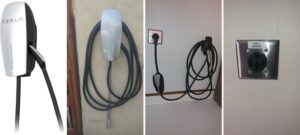Can the ID4 use a Tesla charger? This is a question that has been buzzing around the electric vehicle community lately. If you own an ID4 and are wondering if you can charge it using Tesla’s charging infrastructure, you’ve come to the right place. Today, we will delve into this topic and explore the compatibility between the ID4 and Tesla chargers. Whether you’re a proud ID4 owner or considering purchasing one, let’s find out if you can easily charge your ID4 with a Tesla charger. So, let’s get started and shed some light on the intriguing topic of “Can ID4 use Tesla charger?”
Can ID4 Use Tesla Charger?
The popularity of electric vehicles (EVs) has been steadily increasing over the past decade, with more and more car manufacturers introducing their own models to the market. Among these manufacturers, Tesla has emerged as a leader in the EV industry, boasting innovative technology and a widespread Supercharger network. However, if you own a Volkswagen ID4, you may wonder if you can use a Tesla charger to power up your vehicle. In this article, we will explore the compatibility between the ID4 and Tesla chargers.
Understanding Charging Standards
Before we delve into whether the ID4 can use a Tesla charger, it’s essential to understand the different charging standards used in the EV industry. The two prevalent charging standards are the Combined Charging System (CCS) and Tesla’s proprietary charging system.
1. The CCS is an open standard adopted by most EV manufacturers, including Volkswagen. It supports both alternating current (AC) charging and direct current (DC) fast charging. The CCS connector combines the AC Type 2 and DC Type 2 connectors into one, making it versatile and widely compatible.
2. Tesla, on the other hand, uses their unique Tesla Connector, commonly known as the Tesla charging cable or Tesla Wall Connector. This connector is designed specifically for Tesla vehicles and is not compatible with other EV models without the use of an adapter.
Compatibility Between ID4 and Tesla Chargers
Now that we have an understanding of the charging standards let’s explore whether the ID4 can use a Tesla charger.
1. Physical Compatibility:
– The physical design of the Tesla Connector differs significantly from the CCS connector used in the ID4. The Tesla Connector has a proprietary shape and size, making it incompatible with the ID4’s charging port without an adapter.
– However, it’s worth noting that adapters are available in the market that can convert the Tesla Connector to a CCS connector or other standards. With the use of an appropriate adapter, it is possible to connect a Tesla charger to the ID4.
2. Charging Protocol Compatibility:
– Apart from the physical differences, there are also variations in the charging protocols between Tesla and other EV manufacturers.
– Tesla uses a unique communication protocol known as the Tesla High Power Wall Connector Protocol, which allows for high-power charging between the vehicle and the charger.
– The ID4, on the other hand, follows the standardized CCS communication protocol for charging.
– These differences in charging protocols can lead to compatibility issues when using a Tesla charger with the ID4, even with the use of an adapter.
3. Charging Speed and Power:
– Another crucial aspect to consider is the charging speed and power capabilities of both the ID4 and Tesla chargers.
– Tesla vehicles are designed to take full advantage of the high-power Supercharger network, which can provide charging speeds of up to 250 kW in certain models.
– The ID4, while capable of fast charging, does not support charging speeds as high as those offered by Tesla Superchargers. The maximum charging power for the ID4 is typically around 125 kW, depending on the specific variant.
– It’s important to ensure that the charging infrastructure you use is compatible with the charging capabilities of your vehicle to optimize charging times and efficiency.
Alternative Charging Options for ID4
If using a Tesla charger with the ID4 proves to be impractical due to compatibility or charging speed limitations, there are alternative charging options available for ID4 owners.
1. Home Charging:
– The most convenient and accessible method of charging your ID4 is by using a home charging station. Volkswagen provides their own ID.Charger, which is a wall-mounted home charging station specifically designed for the ID4.
– The ID.Charger uses the standardized CCS connector, ensuring compatibility and ease of use. It allows for AC charging at various power levels, depending on the installation and capabilities.
– Home charging stations, including the ID.Charger, are available in different power ratings to accommodate varying charging needs. It’s crucial to consult with a qualified electrician to determine the appropriate charging station for your home and electrical setup.
2. Public Charging Infrastructure:
– In addition to home charging, there is a growing network of public charging stations available for EV owners.
– These public charging stations often support multiple charging standards, including CCS, which is compatible with the ID4.
– Various providers, such as Electrify America and ChargePoint, offer a wide network of charging stations across the country, providing convenient options for ID4 owners to charge their vehicles while on the go.
While the ID4 cannot directly use a Tesla charger due to physical and protocol differences, there are potential solutions available. Adapters can bridge the gap between the Tesla Connector and the ID4’s charging port, but compatibility issues may still arise due to charging protocols. It’s essential to consider alternative charging options, such as home charging stations or public charging infrastructure, to ensure efficient and convenient charging for your ID4. Always consult with your vehicle manufacturer or charging infrastructure provider for the most accurate and up-to-date information regarding charging compatibility and options.
Frequently Asked Questions
Can the ID4 use a Tesla charger?
Yes, the ID4 can use a Tesla charger.
How do I charge my ID4 using a Tesla charger?
To charge your ID4 using a Tesla charger, you will need a Tesla-to-J1772 adapter. This adapter allows you to connect the Tesla charger to the ID4’s charging port.
Where can I purchase a Tesla-to-J1772 adapter?
You can purchase a Tesla-to-J1772 adapter from various online retailers or directly from Tesla. It is important to ensure that the adapter is compatible with both Tesla chargers and the ID4.
Can I use any Tesla charger with the ID4?
Yes, you can use any Tesla charger with the ID4 as long as you have the Tesla-to-J1772 adapter. However, it is always recommended to check the charger’s specifications and compatibility with the ID4 before usage.
Is there any difference in charging speed when using a Tesla charger with the ID4?
When using a Tesla charger with the ID4, the charging speed may vary. The ID4 is capable of charging at a maximum rate of 125 kW, but the actual charging speed depends on the capabilities of the Tesla charger and the charging infrastructure.
Can I use a Tesla Supercharger to charge my ID4?
No, you cannot use a Tesla Supercharger to charge your ID4. Tesla Superchargers are designed specifically for Tesla vehicles and use a different charging protocol. Instead, you can use other Tesla chargers or third-party chargers with the Tesla-to-J1772 adapter.
Final Thoughts
In conclusion, the ID4 is not compatible with Tesla chargers. While both electric vehicles offer impressive features and performance, their charging systems are not interchangeable. Tesla uses its proprietary Supercharger network, which is specifically designed for Tesla vehicles. On the other hand, the ID4 utilizes the more widely available and standardized CCS charging standard. Therefore, if you own an ID4, you will need to find CCS-compatible charging stations rather than relying on Tesla chargers. It’s essential to consider this compatibility factor before embarking on a long journey or investing in home charging infrastructure.



